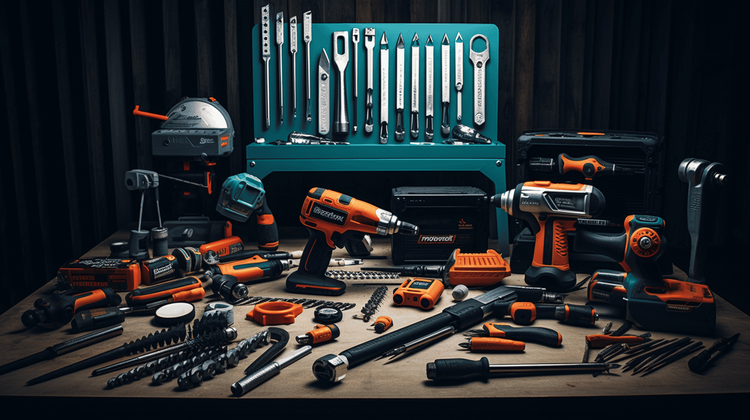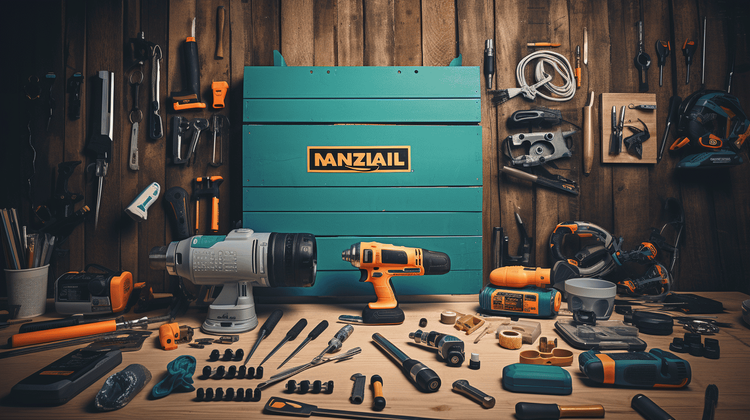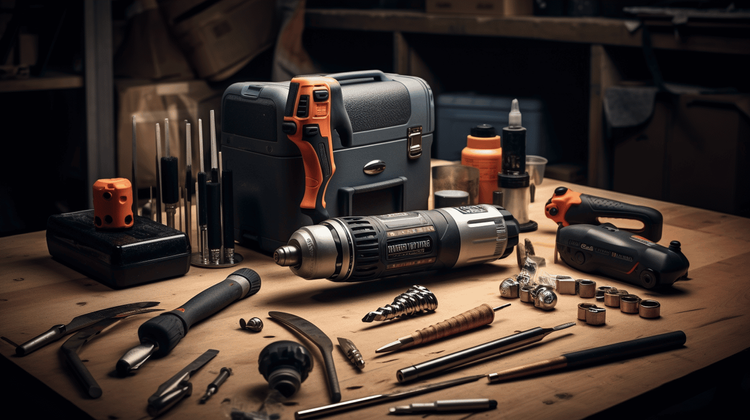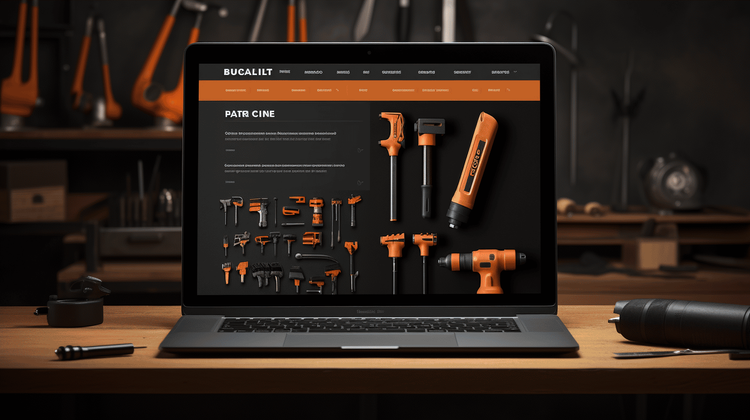DIY Projects Made Easy: Choosing the Right Tools for Every Job

Welcome to the world of DIY projects! Whether you're a seasoned DIY enthusiast or just starting out, one thing is for certain - choosing the right tools can make all the difference in the success and enjoyment of your projects.
There's a satisfying sense of accomplishment that comes from completing a project with your own two hands. And with the right tools in your arsenal, you'll be well-equipped to tackle any task that comes your way.
In this article, we'll explore the importance of choosing the right tools for your DIY projects. We'll dive into the different types of tools, their uses, and how they can enhance your efficiency, accuracy, and overall safety.
So, grab your toolbelt and let's get started on this DIY adventure!
Understanding the Importance of Choosing the Right Tools
When it comes to tackling DIY projects, one of the most crucial aspects to consider is choosing the right tools for the job. Not only does this ensure that you can complete your projects efficiently and accurately, but it also helps in maintaining safety and avoiding unnecessary risks. Additionally, investing in quality tools can save you money in the long run. Let's delve deeper into why choosing the right tools is so important:
Efficiency and Accuracy
- Using the appropriate tools for a specific task can significantly improve your efficiency.
- Tools that are designed for a specific job make the process smoother and more streamlined.
- When you have the right tools at your disposal, you can complete your projects in less time and with less effort.
Safety and Risk Avoidance
- Working with the wrong tools can be dangerous and increases the risk of accidents.
- Using tools that are not meant for a particular job can lead to sloppy work and potentially compromise your safety.
- Choosing tools that are specifically designed for the task at hand ensures that you can complete your projects without putting yourself at risk.
Cost-effectiveness
- Investing in the right tools may seem like an additional expense, but it can save you money in the long run.
- High-quality tools are more durable and long-lasting, so you won't have to replace them as frequently.
- Poor-quality tools can break easily, forcing you to purchase replacements, which can end up costing you more in the long term.
Now that you understand the importance of choosing the right tools for your DIY projects, let's take a look at some essential hand tools that every DIY enthusiast should have in their toolbox.
Essential Hand Tools for DIY Projects
When it comes to tackling DIY projects, having the right tools is essential. While power tools may seem tempting, you'll be surprised at how often you'll find yourself reaching for your trusty hand tools. These tools are not only versatile but also handy for quick fixes and small tasks. Here are some essential hand tools that should be in every DIY enthusiast's toolbox:
Hammer

A hammer is a must-have tool for any DIY project. From driving nails to removing them, a good hammer will be your best friend. Look for a hammer with a comfortable grip and a balanced weight. Aim for a hammer with a claw on the back for pulling nails if needed.
Screwdriver Set

Whether it's tightening a loose screw or assembling furniture, a screwdriver set is a must. Look for a set that includes both flathead and Phillips-head screwdrivers in various sizes. A magnetic tip can also be helpful in holding screws in place.
Pliers

Pliers are incredibly versatile and can come in handy for a wide range of tasks. From gripping and bending wires to pulling nails, pliers are a go-to tool. Look for a pair with cushioned grips for added comfort and a strong, durable construction.
Adjustable Wrench

An adjustable wrench is essential for any plumbing or mechanical work. This versatile tool allows you to tackle different-sized nuts and bolts without needing an entire set of wrenches. Look for a wrench with a wide jaw opening and a comfortable grip.
Measuring Tape

Accurate measurements are crucial for any DIY project. A measuring tape will become your go-to tool for ensuring precise cuts, spacing, and layout. Look for a tape that is at least 25ft long and has clear markings for easy reading.
Remember, investing in high-quality hand tools will pay off in the long run. These tools will last longer and provide better results compared to cheap, flimsy alternatives. Don't be afraid to spend a little extra for quality.
"A man must have a good set of hand tools before he can consider himself truly handy." - Tim Allen
Next, let's explore some power tools that can take your DIY projects to the next level!
Power Tools for More Advanced DIY Projects
When it comes to tackling more advanced DIY projects, power tools can be a game-changer. These tools are designed to provide more efficiency and speed, making your projects easier and more enjoyable. Whether you're a seasoned DIY enthusiast or just starting out, having the right power tools in your arsenal can make a world of difference. Here are some essential power tools for more advanced DIY projects:
Cordless Drill
A cordless drill is a must-have power tool for any DIYer. It allows you to drill holes and drive screws with ease. Look for a drill with adjustable speed settings, a comfortable grip, and a reliable battery life. Having a cordless drill will save you from the hassle of dealing with cords and give you the freedom to move around your workspace.
Circular Saw
A circular saw is perfect for making straight cuts in various materials, such as wood or plywood. It's a versatile tool that can be used for a wide range of projects, from building furniture to constructing outdoor structures. Look for a circular saw with a powerful motor, a sturdy base plate, and an adjustable cutting depth for more precision.
Jigsaw
If you need to make curved or intricate cuts, a jigsaw is your go-to tool. It's ideal for cutting shapes, patterns, or curves on wood, plastic, or metal. Look for a jigsaw with variable speed control, a beveling shoe for angled cuts, and a comfortable grip to ensure maximum control and accuracy.
Power Sander
A power sander is essential for achieving smooth and polished surfaces. It helps in removing old paint or varnish, sanding down rough edges, and preparing surfaces for painting or staining. Look for a power sander with multiple speed settings, a dust collection system, and durable sanding pads for long-lasting performance.
Angle Grinder
An angle grinder is a versatile tool that can be used for grinding, cutting, and polishing various materials, including metal, stone, or concrete. It's perfect for tasks like removing rust, cutting through tiles, or shaping metal surfaces. Look for an angle grinder with a powerful motor, adjustable speed settings, and safety features like a protective guard.
Power tools can be intimidating if you're not familiar with them, but with proper handling and safety precautions, they can greatly enhance your DIY experience. Remember to always read the user manual, wear appropriate safety gear, and work in a well-ventilated area when using power tools.
"With the right power tools, you can take your DIY projects to the next level and achieve professional-looking results."
Specialized Tools for Specific DIY Tasks
When it comes to DIY projects, having the right tools for the job can make all the difference. While basic hand tools and power tools are essential for most projects, there are also specialized tools that can help you tackle specific tasks with ease. Whether you're painting a room, fixing electrical issues, or working on woodworking projects, having the right specialized tools can help you achieve professional results. Here are some examples of specialized tools for specific DIY tasks:
Painting Tools
Painting a room or giving furniture a fresh coat of paint is a popular DIY project. To make the job easier and achieve a smooth finish, consider using these specialized painting tools:
- Paint Roller: Ideal for large surfaces, a paint roller helps you cover more area quickly.
- Paintbrushes: Different sizes of paintbrushes will come in handy for detailing and cutting in corners.
- Paint Sprayer: For larger projects or professional-quality finish, a paint sprayer can provide even coverage and save you time.
Electrical Tools
If you're comfortable working with electrical systems, there are specialized tools that can help you tackle electrical projects safely and efficiently:
- Wire Strippers: These tools are designed to remove the insulation from electrical wires, allowing you to make secure connections.
- Voltage Tester: A voltage tester helps you determine if there's electrical current present in a wire or outlet, ensuring your safety.
- Circuit Analyzer: This tool is used to diagnose electrical issues and identify faulty circuits in your home.
Plumbing Tools
For DIY plumbing projects, having the right tools can help you fix leaks, repair faucets, or install new plumbing fixtures. Here are some specialized plumbing tools you might need:
- Pipe Wrench: A pipe wrench provides a sturdy grip on pipes and fittings, making it easier to tighten or loosen them.
- Plumber's Snake: Also known as a drain auger, a plumber's snake helps you clear clogged drains by breaking up debris or pushing it through.
- Pipe Cutter: This tool is essential for cutting pipes to the desired length, allowing you to make precise cuts when installing new plumbing.
Woodworking Tools
If you enjoy woodworking projects, having the right tools can help you create beautiful and functional pieces. Some specialized woodworking tools you might need include:
- Chisels: Chisels are used for carving, shaping, and cutting wood, allowing you to create intricate designs and joints.
- Router: A router is a versatile tool that can be used for shaping edges, cutting grooves, or creating decorative details on wood.
- Miter Saw: Ideal for making precise angled cuts, a miter saw is often used for projects like framing, crown molding, and trim work.
Gardening Tools
For outdoor DIY projects, having the right gardening tools can make landscaping and gardening tasks much easier. Here are some specialized gardening tools to consider:
- Pruning Shears: Pruning shears are essential for trimming branches, shaping shrubs, and maintaining your garden's health.
- Gardening Gloves: Protect your hands from thorns, sharp objects, and chemicals with a good pair of gardening gloves.
- Shovel: A sturdy shovel is a must-have tool for digging holes, moving soil, and transplanting plants.
By using these specialized tools for specific DIY tasks, you can simplify your projects, achieve better results, and make your work more enjoyable. Remember, always research and understand how to properly use these tools to ensure your safety and the success of your DIY projects.
Choosing Quality Tools
When it comes to DIY projects, having the right tools can make all the difference. Quality tools not only make your work more efficient and accurate, but they also ensure your safety and save you money in the long run. But with so many options available, how do you choose the best tools for the job? Here are some factors to consider when selecting quality tools for your DIY projects:
Durability and Longevity
Investing in tools that are built to last is essential. Look for tools made from high-quality materials such as hardened steel or durable plastic. Check for solid construction and sturdy handles that won't break or bend under pressure. Quality tools may cost more upfront, but they will save you from having to replace them frequently.
Ergonomics and Comfort
Using tools that are comfortable to handle can greatly improve your experience and prevent fatigue and strain. Look for tools with ergonomic designs that fit comfortably in your hand and have features like rubberized grips or cushioned handles. These small details can make a big difference, especially during long or repetitive tasks.
Affordability and Value for Money
While it's important to invest in quality tools, that doesn't mean you have to break the bank. Look for tools that offer a good balance between quality and affordability. Compare prices and read reviews to ensure you're getting the best value for your money. Remember, cheap tools may end up costing you more in the long run if they break or wear out quickly.
- "Quality tools not only make your work efficient and accurate, but they also ensure your safety and save you money in the long run."
- "Investing in tools that are built to last is essential."
- "Using tools that are comfortable to handle can greatly improve your experience and prevent fatigue and strain."
- "While it's important to invest in quality tools, that doesn't mean you have to break the bank."
Remember, choosing quality tools is an investment in the success and enjoyment of your DIY projects. By considering factors such as durability, ergonomics, and value for money, you can ensure that you have the right tools for the job and achieve professional-quality results. Happy DIYing!
Safety Tips for DIY Projects
When it comes to DIY projects, safety should be your top priority. Whether you're a seasoned DIY enthusiast or just starting out, it's essential to follow proper safety precautions to avoid accidents and injuries. By taking the time to educate yourself on safety tips and investing in the right tools, you can create a safe and enjoyable DIY experience. Here are some tips to keep in mind:
Wearing Protective Gear
- Always wear appropriate protective gear when working on DIY projects. This includes safety goggles, gloves, and hearing protection.
- Depending on the task at hand, you may also need to wear a dust mask or a respirator to protect yourself from harmful fumes and particles.
Proper Tool Handling
- Familiarize yourself with the proper way to handle and operate each tool before using it. Read the manufacturer's instructions and follow them carefully.
- Keep your work area clean and organized. Clutter can lead to accidents and make it harder to use your tools safely.
- Ensure that your tools are in good working condition before using them. Check for any loose parts or defects that could compromise their safety.
Working in a Well-Ventilated Area
- Some DIY projects involve working with chemicals or materials that produce fumes. It's important to work in a well-ventilated area to avoid inhaling toxic substances.
- If you're working indoors, open windows and doors to promote airflow. If you're working outdoors, make sure you have plenty of fresh air circulating around you.
Remember, accidents can happen even when you take all the necessary precautions. However, by following these safety tips, you can greatly minimize the risk and ensure a safer DIY experience.
"Safety is not an accident. It's a choice." - Unknown
In conclusion, DIY projects can be a fun and rewarding way to improve your home or create something of your own. However, it's crucial to prioritize safety at all times. By wearing protective gear, handling your tools properly, and working in a well-ventilated area, you can reduce the risk of accidents and injuries. Remember, safety should never be compromised for the sake of a project. So stay safe, be cautious, and enjoy your DIY adventures with peace of mind!
Building Your Tool Collection
Building your tool collection is an exciting and essential part of any DIY project. Having the right tools on hand can save you time, money, and frustration. Whether you're a beginner or a seasoned DIY enthusiast, here are some tips for building your tool collection:
Start with Basic Tools
When you're just starting out, it's important to have a foundation of basic tools. These tools will come in handy for a wide range of projects and should be considered essential for any DIY enthusiast. Here are some must-have tools to get you started:
- Hammer: A versatile tool used for driving nails and removing them. Look for a hammer with a comfortable grip and a weight that suits your needs.
- Screwdriver Set: Choose a set that includes both flathead and Phillips-head screwdrivers in various sizes. This will cover most of your screwdriving needs.
- Pliers: Pliers are useful for gripping, twisting, and cutting wires and other materials. Look for a set with both slip joint pliers and needle-nose pliers.
- Adjustable Wrench: An adjustable wrench allows you to tighten or loosen nuts and bolts of various sizes. Invest in a good-quality wrench that will last.
- Measuring Tape: Accurate measurements are crucial in DIY projects. Get a measuring tape with both imperial and metric measurements for versatility.
Gradually Expand Your Collection
As you gain more experience and tackle more complex projects, you'll find that your tool collection needs to grow. Here are a few tools you can consider adding to your collection as you progress:
- Cordless Drill: A cordless drill is a versatile tool that can handle a wide range of drilling and driving tasks. Look for one with multiple speed settings and interchangeable drill bits.
- Circular Saw: A circular saw is great for making straight cuts in wood, plywood, and other materials. Consider safety features like blade guards and a comfortable grip.
- Jigsaw: A jigsaw is perfect for making curved or intricate cuts in wood, plastic, and metal. Look for a jigsaw with adjustable speed settings and orbital action.
- Power Sander: A power sander saves you hours of manual sanding and gives a smooth finish to your projects. Look for one with adjustable speed settings and a dust collection feature.
- Angle Grinder: An angle grinder is a versatile tool that can be used for cutting, grinding, sanding, and polishing. Invest in a quality grinder with adjustable guard positions.
Borrowing or Renting Tools
If you have a specific tool that you need for a one-time project or don't have the budget to buy it right away, consider borrowing or renting it. Borrowing tools from family, friends, or neighbors can save you money and help you determine which tools you use frequently before making a purchase. Some hardware stores also offer tool rental services, allowing you to use specialized tools for a fraction of the cost.
Remember, building your tool collection is a journey, and it's important to invest in quality tools that will serve you well for years to come. Take your time, do your research, and choose tools that align with your specific needs and budget. With the right tools in hand, you'll be well-equipped to tackle any DIY project that comes your way.
"A good tool improves the way you work. A great tool improves the way you think." - Jeff Duntemann
Conclusion
In conclusion, when it comes to DIY projects, choosing the right tools is essential for success. By investing in the right tools, you can ensure efficiency, accuracy, and safety in your projects. Here are the key takeaways from this article:
- Efficiency and Accuracy: The right tools can make your DIY projects easier and more efficient, allowing you to get the job done correctly the first time. Don't underestimate the power of having the right tool for the task at hand.
- Safety and Risk Avoidance: Using the right tools can help you avoid accidents and injuries. Make sure to prioritize safety by using tools that are appropriate for the task and following proper procedures.
- Cost-effectiveness: While quality tools may seem expensive upfront, they can save you money in the long run. Investing in durable and reliable tools will prevent you from having to replace them frequently, ultimately saving you money.
- Building Your Tool Collection: Start with the basic hand tools and gradually expand your collection of power tools and specialized tools as your skills and projects become more advanced. You can also consider borrowing or renting tools that you don't use frequently.
Remember, it's not just about having the right tools, but also taking care of them properly. Clean and store your tools correctly to ensure their longevity and performance. Lastly, always prioritize safety by wearing protective gear and working in well-ventilated areas.
So, the next time you embark on a DIY project, make sure to choose the right tools for the job. Happy DIY-ing!
Frequently Asked Questions
- What are the essential tools for DIY projects?The essential tools for DIY projects include a hammer, screwdrivers (both flathead and Phillips head), pliers, tape measure, level, utility knife, drill, saw, and a set of wrenches.
- How do I choose the right tools for a specific DIY project?To choose the right tools for a specific DIY project, start by understanding the requirements and tasks involved. Research and make a list of tools commonly used for that type of project. Consider factors like durability, quality, and budget when selecting tools.
- Where can I buy the necessary tools for my DIY projects?You can buy the necessary tools for your DIY projects from various places such as local hardware stores, home improvement centers, online marketplaces like Amazon, or specialized tool retailers.
- Are power tools necessary for DIY projects?Power tools can significantly simplify and speed up DIY projects, but they may not be necessary for every job. Evaluate the complexity of your project and consider investing in power tools like drills, saws, or sanders if they will save you time and effort in the long run.
- How can I ensure the proper maintenance of my tools?Proper maintenance of tools involves cleaning, lubricating, and storing them in a dry and organized manner. Regularly inspect your tools for any damages or wear and tear, and address any issues promptly. This will help prolong their lifespan and ensure they function optimally.




